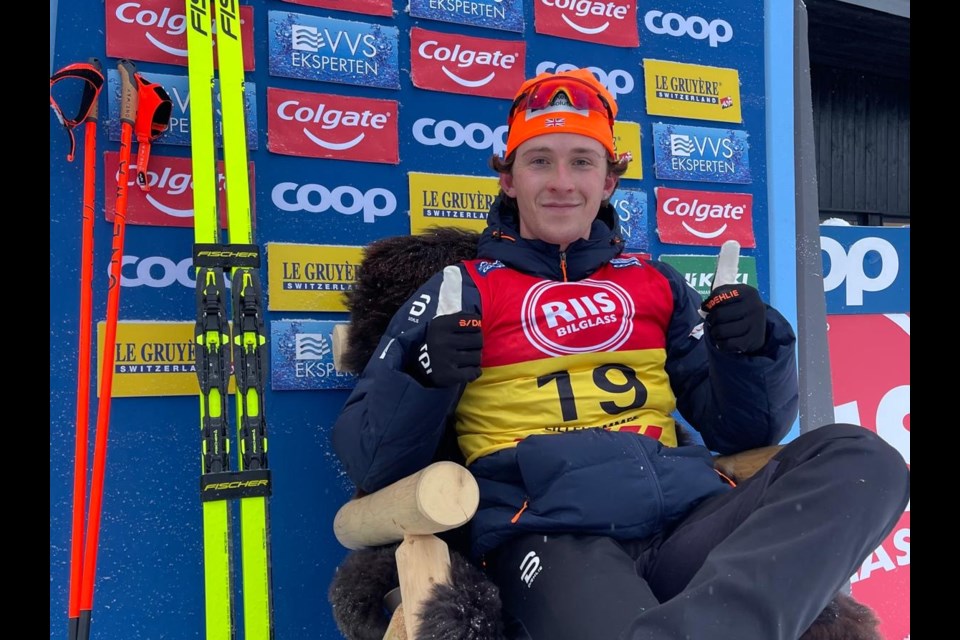Joe Davies may wear the Union Jack on his World Cup kit these days, but make no mistake: he's a Sea to Sky guy with lots of ties to the region.
Davies grew up in Pemberton and found himself in Spud Valley Nordics' Jackrabbit program at eight years old. Upon discovering his nascent aptitude for cross-country skiing, his parents switched their child over to Whistler Nordics: the club that would raise him throughout high school.
Fast forward to the present, and the 23-year-old is coming off three straight top-16 World Cup results in Ruka, Finland and Lillehammer, Norway.
"It's definitely been a really, really good start to the season," remarked Davies, who only placed in the top 20 once last year, in Minneapolis, Minn. "Coming into this season, I wasn't 100-per-cent sure where I was going to be. I wanted to at least show that I could recreate [my performance in Minnesota].
"Had an injury throughout the fall too. I broke my foot, so I had seven weeks of not-ideal training. I was a little uncertain as to how things were going to go, but it was really nice to get the reinforcement that everything's working."
Back in February, Davies also skied to a pair of top-20s at the FIS U23 World Championships in Planica, Slovenia.
A two-sided career
Not a full-time international athlete, Davies studies civil engineering at the University of Utah. Of course, he's also a part of the Utes' skiing squad.
The Pembertonian has already achieved considerable NCAA success. Last year he won a national championship representing the University of Alaska Fairbanks, beating second-placer John Hagenbuch by 25 seconds.
"It's cool to have those two sides of my racing career: the World Cup and the college scene, [which is] so competitive these days," said Davies. "They are two very different worlds, though. Everyone in the World Cup is incredibly focused … but there's a little less [killer instinct] between NCAA teams. Something I really appreciate about college skiing is that everybody's so relaxed. You're just seeing your friends—but once the race is on, it's equally competitive and people are there to win."
Despite his valuable experiences and friendships in Fairbanks, Davies moved to Salt Lake City for pragmatic reasons. He spends approximately half the year in Europe for competitions and wanted a more central location to base himself out of. Living in Utah means he would face 12-odd hours of travel to reach Oslo, Norway, as opposed to 20 hours flying from Alaska.
Furthermore, Davies would consider the Utes one of the NCAA's best varsity skiing programs. Many of his friends speak highly about it as well.
Dual allegiances
You might wonder at this point: why is a man who was born and raised in B.C. racing for Great Britain?
Davies spent his fair share of time in Nordiq Canada's development pipeline. He is a former member of the Maple Leaf's junior national unit and Foothills Nordic in Calgary, Alta.
"[Switching allegiances] took a lot of thought," he admitted. "When the British team reached out to me, explained their setup and how much they were willing to put into me as an athlete … it just made sense. I've always been pretty good at choosing the right path, so I trusted that [representing Britain] was the right thing to do. It's been amazing."
Though his recent results are nothing to scoff at, Davies knows there's a marked gap between many of North America's top cross-country athletes and the elites from Norway, Sweden and Finland. He believes, however, that time spent training and competing in Europe will help him start to close that gap.
Going forward, the British Columbian hopes to win another NCAA title for Utah and solidify himself as a regularly-seen presence in the top 15 of any given World Cup race. If he's able to do that, a future in the top 10 is definitely achievable.
For now, though, Davies is home and still has lots of love for Whistler Nordics.
"That's the team that I grew up racing with and who I feel very connected to," he said. "Everybody who's a part of the Whistler Nordics is so into skiing that it felt natural to always continue. Brent Murdoch, Tony Peiffer and all these people poured their heart into the club, and many of us athletes went on to race after high school even though we weren't a very big team."




